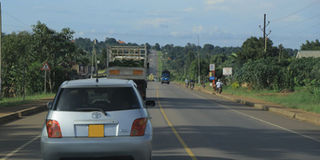Keeping safe on the road during festive travels

Because you do not see an oncoming vehicle from the incoming direction, do not overtake in corners or even overtake more than one car at a time. PHOTO/Roland D. Nasasira
What you need to know:
Driving upcountry for Christmas is a cherished tradition, but it is crucial to prioritise safety on the roads, especially during such a time when the roads are busy.
One of the things that characterise the festive season is an increase in the number of vehicles on the road as people travel to different destinations to celebrate with their loved ones. As you prepare for the journey, regardless of whether you are a driver, passenger or pedestrian, these tips will make sure you enjoy your journey.
Micheal Kananura, the public relations officer of the traffic directorate, says if you have never driven on the highway or any long distances, do not risk starting this festive season. He adds that driving when the roads are busy is tiresome and requires a lot of caution which might be troublesome for a driver not accustomed to driving long distances.
“Instead, hire an experienced driver or postpone your first time long distance drive to a time when the roads are not as busy,” Kananura advises.
Observe speed limits
On the road, it is advisable to drive within the recommended speed limits, as the maximum driving speed on all Ugandan highways is 100km/hr. Recently, during revision of speed limits by the ministry of works and transport, through partnerships with civil society organisations such as Centre for Policy Analysis (CEPA), the maximum driving speed in built up areas with high pedestrian volumes was reduced from 50km/hr to 30km/hr. This is because there are high chances of surviving a road crash when you knock someone while driving at 30km/hr compared to 50km/hr.
Avoid overtaking
Because you do not see an oncoming vehicle from the incoming direction, do not overtake in corners or even overtake more than one car at a time. Before you overtake, be patient and use your driving and side mirror to ensure you are not aiming to overtake at the same time as the motorist driving behind you.
Avoid distractions
When driving, your hands, eyes, mind and legs are in constant use. Kananura says one should avoid any distractions such as phones, loud music and conversations from passengers.
“Do not be tempted to use your phone to inform the people at your destination where you have reached since this might cause you to speed in a hurry to reach your destination. For motorcyclists riding for long distances, wear a crash helmet, thick clothes, and reflective jacket and do not carry more than one passenger,” Kananura says.
Plan your journey
Winstone Katushabe, the commissioner transport regulation and safety at the ministry of works and transport, recommends planning your journey and developing a journey management plan to avoid last minute decisions which normally lead to unnecessary stampede.
“A journey management plan involves where to make stopovers to rest. Start your journey early so that you reach early. Before you start your journey, guarantee you have a valid driving license of the right class and the vehicle you are driving falls within your license class,” Katushabe adds.
Prepare for night breathalysers
Whereas it is mostly public service vehicles (PSVs) drivers who drink alcohol at night, those in private vehicles will also not be spared at traffic checkpoints. There will be breathalyzers at checkpoints to make sure your driver is not drunk. The law does not allow a public service driver to have any alcohol in their body system.
For drivers of PSVs, specifically buses, you must have valid badges and your photo hanged in the bus for easy identification upon inspection by traffic police and the passengers. Buses must also have valid PSV licenses and valid route charts. No school bus will be allowed to operate during the festive season since these are not allowed to operate as a PSVs.
“As a passenger, you should act as a road safety ambassador. Make sure your driver does not use their phone, does not eat while driving or engage in any other activity that will cause him to get distracted. If they are over speeding or engaged in any other form of carelessness, record a video or report them to the authorities on toll free number 0800 199 099,” Katushabe advises.
“You will be stopped at different checkpoints but do not feel inconvenienced or complain because we want to confirm that the drivers are trained and are not drunk. You may want your driver to drive fast but resist this temptation. Better to arrive safe than be involved in a road crash because the driver was drunk,” he adds.
Follow road markings
Allen Kagina, the executive director of Uganda National Roads Authority (UNRA) agrees with Katushabe and Kananura, advising that the responsibility of saving lives cannot be delegated to traffic police or civil society organisations and other stakeholders.
“Roads are constructed to be safe for you. Unfortunately, most of you ignore features such as road markings and lane separators. We do not mark roads to make them beautiful but to guide you on where you should not drive or overtake or the speeds beyond which you should not drive. Until you take road safety as your responsibility to drive carefully and safely and watch out for pedestrians, you will continue to treat road crashes as somebody else’s problem,” Kagina says.
Wear your seatbelt
When you enter the car whether as a driver or passenger, the first thing to remember is to wear is your seatbelt. In an unfortunate event of a crash, a seatbelt holds you in your seat to avoid being ejected to the front of the car through the windscreen. Also, guardians must ensure all children wear their seatbelts as well.




